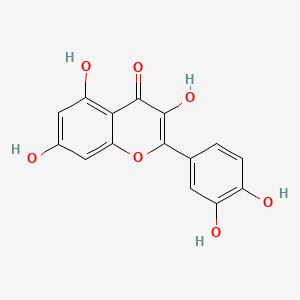quercetin
quercetin is a lipid of Polyketides (PK) class. Quercetin is associated with abnormalities such as Coronary heart disease, Myocardial Infarction, Cirrhosis, Coronary Arteriosclerosis and Vascular ring. The involved functions are known as Vasodilation, physiological aspects, Fermentation, Process and Ingredient. Quercetin often locates in Arterial system, Endothelium, Skin, Endothelium, Vascular and Tissue specimen. The associated genes with quercetin are P4HTM gene, SULT gene, UGT1A1 gene, ARHGAP26 gene and PLXNB1 gene. The related lipids are blood lipid, Promega, Steroids, Phosphatidylserines and Fatty Acids. The related experimental models are Knock-out, Mouse Model, Xenograft Model, Tissue Model and Cancer Model.
References related to lipids published in J. Nutr.
| PMID | Journal | Published Date | Author | Title |
|---|---|---|---|---|
| 9482769 | J. Nutr. | 1998 | Conquer JA et al. | Supplementation with quercetin markedly increases plasma quercetin concentration without effect on selected risk factors for heart disease in healthy subjects. |
| 12612140 | J. Nutr. | 2003 | Pal S et al. | Red wine polyphenolics increase LDL receptor expression and activity and suppress the secretion of ApoB100 from human HepG2 cells. |
| 15173420 | J. Nutr. | 2004 | Lesser S et al. | Bioavailability of quercetin in pigs is influenced by the dietary fat content. |
| 17951477 | J. Nutr. | 2007 | Edwards RL et al. | Quercetin reduces blood pressure in hypertensive subjects. |
| 18492835 | J. Nutr. | 2008 | Amasheh M et al. | Quercetin enhances epithelial barrier function and increases claudin-4 expression in Caco-2 cells. |
| 22535755 | J. Nutr. | 2012 | Panchal SK et al. | Quercetin ameliorates cardiovascular, hepatic, and metabolic changes in diet-induced metabolic syndrome in rats. |
